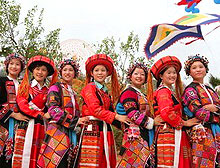 Organised by the Ministry of Culture, Sports and Tourism, the event aimed to show the cultural identities and traditions of the nation’s 54 ethnic groups.
Organised by the Ministry of Culture, Sports and Tourism, the event aimed to show the cultural identities and traditions of the nation’s 54 ethnic groups.Previously, Prime Minister Nguyen Tan Dung had issued a decision making April 19 as the Day of Vietnam’s Ethnic Cultures.
A ceremony to announce the decision took place at the Ethnic Culture and Tourism Village on the April 19 evening, which saw the presence of National Assembly Chairman Nguyen Phu Trong and Deputy Prime Minister Nguyen Thien Nhan.
Following the ceremony, a large cultural programme directed by artist Trong Dai was organised, with the participation of close to 1,000 artists, artisans and village heads.
The programme included five chapters: Hoi Xuan (Spring Festival), featuring festivities from all of Vietnam’s regions, and Su Thi (Epics), featuring De Dat De Nuoc epics from the Muong ethnic group and Dam San of the EDe ethnic group.
The other chapters were Hat Giao Duyen (Dual Love Songs) of the country’s three regions, with a reading of the poem Nam Quoc Son Ha (Rivers and Mountains of the Southern Nation) by General Ly Thuong Kiet. The poem was considered the nation’s first declaration of independence in 1077.
The Tinh Yeu va Thu Thach (Love and Challenges) chapter described people coping with the severities of nature, with an extract from Binh Ngo Dai Cao (The Proclamation of the Victory over the Foreign Invaders) by Nguyen Trai, and the last chapter, named Vietnam To Quoc Men Yeu (Vietnam: the Lovely Motherland), was a jubilant mix of Thai dance, Lo Lo sticks and Tay Nguyen gongs.
Some 2,000 delegates from different ethnic groups joined the conference Hoi Nghi Dien Hong (Dien Hong Conference) to discuss traditional culture in various regions and brainstorm ideas for upcoming festivals.
The name of the conference, Dien Hong, stems from an historical event that has come to symbolise the solidarity and patriotism of the Vietnamese people.
During the Tran Dynasty, King Tran Thanh Tong held the Dien Hong Conference in 1284, a meeting at which many generals and nobles gathered together and decided to join the fight against Yuan invaders.
Ethnic groups from 33 provinces and cities nationwide attended the event.